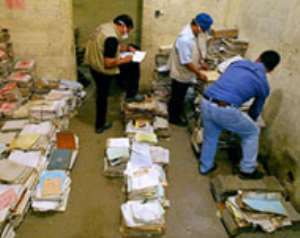
The Guatemalan government says it wants to investigate the disappearance of 45,000 civilians during the country's civil war and hopes to prosecute those responsible.
Senior officials will work with rights groups to create an body dedicated to investigating cases of students and supposed communist sympathisers who were systematically detained and who disappeared during the 1960-1996 conflict.
Frank LaRue, the president's human rights adviser, said: "Relatives of the disappeared carry with them the uncertainty of what exactly happened to their loved ones.
"Uncertainty is a kind of permanent torture for the survivors."
He was speaking at the launch of a commission that will draw up legislation to set up the investigative body.
If approved by Congress, it could lead to a national registry of victims and the prosecution of soldiers, policemen and paramilitaries responsible for the deaths.
Juan Luis Florido, the attorney general, said information obtained by the body could be passed to public prosecutors for use in trials.
Maya Indians
Only a handful of people have been convicted of crimes including massacres and state-sponsored killings during the war. No one has been tried in relation to disappearances.
About 200,000 people, mostly Maya Indians, died in the war, which officially ended when the government and guerrillas signed a UN-backed 1996 peace accord.
A UN truth report found more than 80% of the killings were carried out by state security forces.
The disappeared, which rights groups say number tens of thousands, are not counted in the toll of war dead because the location of their bodies has never been confirmed.
Maria Eugenia Morales of the human rights ombudsman's office said one tactic of the Guatemalan army during the war was to capture suspected subversives, detain and torture them and dump their bodies in the ocean after a summary execution.
Seeking justice
Ruth del Valle, whose 21-year-old brother was killed, and who heads a victims' support group, said: "This is the first time the state is assuming a role in investigating these crimes."
Her brother, a medical student, was tortured and murdered in 1980 after he was kidnapped in the capital along with two friends by men wearing police uniforms.
"We hope that this is an agreement that does not just stay on paper, but that it could lead to actual criminal cases," del Valle said.




 Lay KPMG audit report on SML-GRA contract before Parliament – Isaac Adongo tells...
Lay KPMG audit report on SML-GRA contract before Parliament – Isaac Adongo tells...
 Supervisor remanded for stabbing businessman with broken bottle and screwdriver
Supervisor remanded for stabbing businessman with broken bottle and screwdriver
 NDC watching EC and NPP closely on Returning Officer recruitment — Omane Boamah
NDC watching EC and NPP closely on Returning Officer recruitment — Omane Boamah
 Your decision to contest for president again is pathetic – Annoh-Dompreh blasts ...
Your decision to contest for president again is pathetic – Annoh-Dompreh blasts ...
 Election 2024: Security agencies ready to keep peace and secure the country — IG...
Election 2024: Security agencies ready to keep peace and secure the country — IG...
 People no longer place value in public basic schools; new uniforms, painting wil...
People no longer place value in public basic schools; new uniforms, painting wil...
 'Comedian' Paul Adom Otchere needs help – Sulemana Braimah
'Comedian' Paul Adom Otchere needs help – Sulemana Braimah
 Ejisu by-election: Only 33% of voters can be swayed by inducement — Global InfoA...
Ejisu by-election: Only 33% of voters can be swayed by inducement — Global InfoA...
 Minority will expose the beneficial owners of SML, recover funds paid to company...
Minority will expose the beneficial owners of SML, recover funds paid to company...
 Prof. Opoku-Agyemang has ‘decapitated’ the NPP’s strategies; don’t take them ser...
Prof. Opoku-Agyemang has ‘decapitated’ the NPP’s strategies; don’t take them ser...
